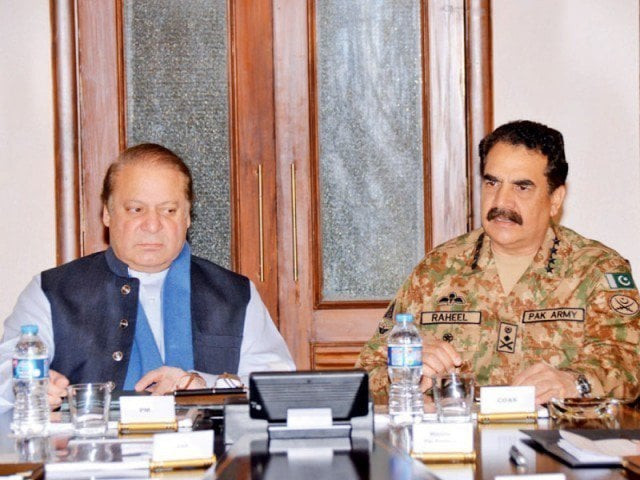Civil-military ties in cold war
Military irked by govt’s continuous failure to come good on its promises

Military irked by govt’s continuous failure to come good on its promises. PHOTO: PID
In addition to pandering to hawks, Mehmood Khan Achakzai’s speech in the National Assembly and the rejoinder by the government’s spokesperson, political parties have started moving towards a point of no-return. The Senate chairman too has urged the government to convene a joint meeting of both houses.
Senators concerned at ‘disconnect’ in civil-military ties
But the public agrees with the military commanders that the government’s policies and priorities have been misplaced.
Amidst the clamour, it seems Nawaz has forgotten that it was the army chief General Raheel Sharif who played a major role, more than parliament, to save his government from falling under the weight of the Pakistan Tehreek-e-Insaf (PTI) protest last year. Gen Raheel staved off internal and public pressure to give the government another chance.
The military had clarified to the government after the Army Public School attack in December 2014 that to eradicate the terrorism, civil institutions had to play their role. The civil and military leadership had back then agreed that under the national action plan long-term steps would be taken to eradicate terrorism, key among those being the autonomous working of the National Accountability Bureau because the hefty sums of money which were being pilfered through corruption to be used for terrorist activities.
A blossoming friendship: ‘Military, civil establishment share great relations’
But the federal government’s interest in these matters fell short of the army’s expectations. Nab, which worked on a few cases in Sindh and K-P, was not allowed to work in Punjab despite the fact that the outlawed groups such as the Tehreek-e-Taliban Pakistan and Lashkar-e-Jhangvi acquire most of their human and material support from the province. It was feared that NAB would unearth corruption in the mega power and transportation projects.
Development in the Federal Administered Tribal Areas (Fata) was also an area of contention with the army of the view that its efforts in the region were not being matched by the civilian apparatus. Madarassa reforms too had been delayed. Moreover, the pace and nature development projects was contrary to what had been agreed under NAP.
Further, decisions made by the apex committees were not being implemented in spirit, rendering them almost useless. Delays in completing JIT inquires, especially that of Pakistan Peoples Party leader Dr Asim Hussain, too has irked the military.
Judicial system: Rabbani seeks lawyers’ support
According to sources, the Interior Minister Chaudhry Nisar had opposed a hard response from the government, but hawks held that since the army chief was about to leave for the US, a soft response would lead the US establishment to believe the PML-N-led government was weak.
Published in The Express Tribune, November 13th, 2015.



















COMMENTS
Comments are moderated and generally will be posted if they are on-topic and not abusive.
For more information, please see our Comments FAQ